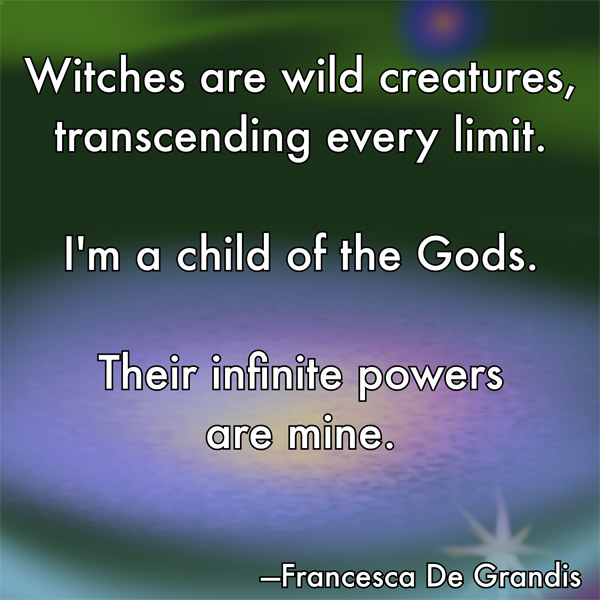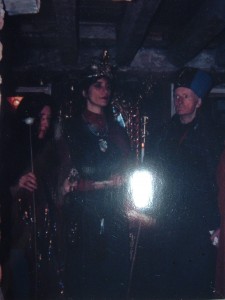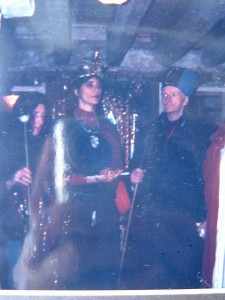For some individuals, witchcraft is a journey of finding one’s unique style of magic, own cosmology, and personal philosophy.
This post was on Witches and Pagan in 2016, at http://witchesandpagans.com/sagewoman-blogs/a-faerie-haven.html
Have you seen the popular lists of different types of witches—e.g., traditional witch, Gardnerian witch, Faerie witch, eclectic witch, hedge witch—with precise definitions for each category? These charts help some beginners. Learning you fit a certain style can be validating and reassuring. It also makes some newcomers feel they belong.
But this post is for beginners who find the categories make things really difficult. Everyone else, I’m not naysaying what works for you; this entire post is simply ideas and methods that work for me, in case they’re useful to someone. I don’t want the charts thrown out. They’re great for some people. And with that:
There are individuals whose witchcraft entails a journey of finding one’s unique style of magic, own cosmology, and personal philosophy. Being new to Pagan community and being told there are specific witch types, each with very specific definitions, can box these folks in, lead them to think they won’t fit anywhere in the Pagan community, and ill-legitimize personal self-discoveries that transcend the categories.
What if you come from a traditional witch family, talk to fairies, and enjoy practicing Gardnerian magic occasionally? Sure, that might classify you as an “eclectic witch,” but that term is redundant historically speaking; it was once a given that witches were eclectic, because witches understand the connectivity of all things. To me, the term “eclectic witch” robs me of my heritage. My witchy heritage fuels spells, making them powerful.
As to connectivity, the Old Gods unite me with the enchantment that flows through the entire universe. That current carries me, its sweep making me joyful, as it bears me toward even more joy. But “eclectic witch” implies magic is not in everything around me and thus denies what’s inherent to many folks’ witchcraft.
In the same vein, I see witches as wild creatures, transcending every limit. I’m a child of the Gods. Their infinite powers are mine. Mind you, I’m not suggesting I can successfully cast every spell anyone else can cast. I believe witches can have specialties.
In any case, categorizing keeps some people from developing specialties. These are folks whose process demands they look not at definitions but into their own selves and, despite how scary it might be, journey into seeming formlessness until it becomes recognizable as their special gift—their specialty.
 I love—and use—the different terms for types of witches. They’re great jumping off points, e.g., for connecting with like-minded individuals.
I love—and use—the different terms for types of witches. They’re great jumping off points, e.g., for connecting with like-minded individuals.
They also can be pointers. But I use the terms the old way: to evoke—lyric speaking to our wild witch hearts and whispering of the undefinable and unlimited—rather than as part of quantitative charts, mapping magic out so exactly as to be … boringly limited for some folks.
I love magic so much it makes me sad to realize charts might crush certain people’s magic.
Also, poor scholarship defines witch types incorrectly. For example, it’s sadly a current given that Gardnerian Wicca bears little resemblance to traditional witchcraft. I lived in a Gardnerian household in England with one of Gerald Gardner’s students and, as a traditional witch, I can tell you people living in that house practiced old-fashioned witchery. Furthermore, I met members of the family tradition that greatly influenced Gerald.
Lack of scholarship also portrays traditional witchcraft as consistently the same. It varied, village to village and family to family.
And many a scholar will say “eclectic witch” makes no historical sense. Global travel is not a modern occurrence. Various ancient cultures shared their rituals constantly.
Are you dismayed by witch categories because they make you feel the magical Art has been divided up like slices of a pie … and you feel like the whole pie? Be the whole enchanted pie.
If you’re a fledging witch who resonates with what I’ve written, I support you not by giving you categories to validate you, but by validating who you already are. Like most of us when we come into Pagan community, you’ve always had Paganism in your heart and life, perhaps without having named it as such. So trust what you already know and build on it. You have the intelligence and insightfulness needed to do so.
Enjoy the names for all the different types of witches, or use none of them. But claim your path as valid.
By “valid,” I’m not saying everything you do currently as a witch is always safe and effective. No one is perfect. Also, some spellcrafting requires substantial training. Get a teacher if you want. But don’t worry about what “type” of witch a prospective teacher is. Choose someone whose spirit calls you and who honors your spirit in turn, whether or not you know how to describe your path. Witches used to work together in all their differences and likenesses, getting along just fine, learning just fine.
I teach. Classes are mostly via group phone calls (aka telesminars): you don’t need a computer or any special technology to attend; just dial the phone. Subscribe to my free newsletter, which gives details about upcoming classes: https://outlawbunny.com/newsletter/
What sort of witch are you? You’re you! So mote it be.


